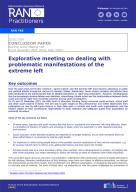Details
- Publication date
- 22 February 2024
- Author
- Directorate-General for Migration and Home Affairs
- Country
- Italy
- RAN Publications Topic
- Violent far-left extremism
Description
Over the past years, terms like ‘wokeism’, ‘cancel culture’ and ‘the extreme left’ have become ubiquitous in public and political debate throughout various EU Member States. Statistically, fewer violent incidents and attacks have been attributed to the extremist left than to Jihadist extremism or right-wing extremism. However, developments like the increasingly divisive debate over identities, intensifying climate action and the confrontations between Antifa youth and the far right have increased concerns among youth practitioners.
On 22 and 23 November 2023, the RAN Youth & Education Working Group convened youth workers, school staff and other youth experts in Rome. The aim was to gain insight on this phenomenon and collect testimonies from participants on how far-left topics feature in their daily work in schools and youth work organisations, and the related impact on their professional responsibility to build resilience and safeguard pupils from exploitation by extremist recruiters.
Some of the key outcomes are below.
- In some cases, teachers and youth workers feel that due to ‘combative and intolerant’ left-wing attitudes, there is a limitation of freedom of speech and exchange of ideas, which are essential in a safe classroom/learning environment.
- Social exclusion, either between students and teachers or amongst students, occurs when someone does not share leftist ideas or is perceived to hold far-right beliefs.
- It’s important to make young people aware of the possible harmful implications of their activist expression, e.g. by causing indirect harm to others or by getting themselves and their peers into trouble.
- Schools should take on a more formative (rather than reactive) role to developments in society: not judging one side of the argument, but always standing for peace and having an ethos of respectful and fruitful discussion.
This conclusion paper gives an overview of practitioners’ experiences with problematic actions of pupils adhering to far-left ideology. Because manifestations of this ideology range from non-violent to effective extremism, we discuss this phenomenon across three levels: from problematic and affective polarisation, to escalating disruptive activism, to concrete acts of violence. For each of these tiers, we elaborate on how this poses challenges for prevention of violent extremism (PVE) practitioners working with young people. Finally, we share practitioners’ recommendations on how to deal with these cases.

